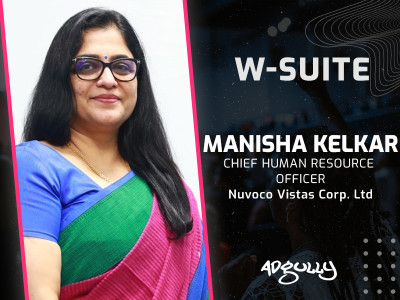“Gender can't define if one is good or bad at crisis managementâ€
We, at Adgully, have always saluted and honoured women managers and leaders across diverse fields. W-SUITE is a special initiative from Adgully that has been turning the spotlight on some of the most remarkable women achievers in M&E, Advertising & Marketing, PR & Communication industry. In the refurbished series, we seek to find out how women leaders have been managing their teams and work as well as how they have been navigating through the toughest and most challenging times brought about by the global pandemic.
Click here to check the Award Categories
Shanu Singh, Chief Marketing Officer, ASK Group, is leading the brand transformation, marketing and PR mandate for the organisation. She has over 15 years of experience in brand building, marketing, and banking. Prior to joining the ASK Group, she was Director – Brand & Marketing at Standard Chartered Bank, managing Consumer, Private and Business Banking. Previously, she has also worked with Kotak Mahindra Bank.
In conversation with Adgully, Shanu Singh, Chief Marketing Officer, ASK Group, speaks about lessons she learned as a women leader, gender sensitivity and inclusion, maintaining work life balance and more.
How do you think the role and scope of women leaders has widened in the post-pandemic world?
The impact on roles and scope of leaders is gender neutral. The pandemic created new challenges for everyone. I, for one, do not agree with boxing all women who are leaders into one homogenised category of “women leaders”. For leaders, while the pivot to digital helped sustain productivity, the remote working took away a number of input parameters which helped you gauge your team’s well-being. Leaders had to find new ways, open newer channels of communication to keep the teams engaged, and walk a tight rope of maintaining productivity as well as the team’s well-being. The question was – were you able to lead effectively, with more variables thrown into the fray, sustain delivery, and still be empathetic.
For women in the workforce (in entry to mid-levels), the work from home model added a lot more to their plate and increased the demands on their time – especially if they didn’t have strong support systems at home, be it the right amount of help or a supportive spouse and family.
The rapid transition to digital, an uncertain economic landscape, charting unknown waters, working from home – how have you been navigating during the COVID-19 times? How are you maintaining work-life balance in the new normal?
In BFSI, transition to digital isn’t new – so, that wasn’t an issue. Collaboration in full remote mode did take a bit of learning for me, as I find it easier to engage and collaborate in person. So, I did feel work-relationships started getting a bit transactional and I had to make an extra effort to not let that happen.
While we were working from home, I tried to build an end time for the workday – which was completely unsuccessful. Eventually, I built a stronger prioritisation matrix to bring more sanity in where I invested my time. Honestly, now that we are back to office, I find it easier to maintain work-life balance.
Multiple studies have shown how women leaders performed better during the COVID-19 crisis. According to you, what makes women the best in crisis management?
I don’t think one’s gender can define if one is good or bad at crisis management. It is a matter of temperament, ability to assess and evaluate the situation, and the appetite to take responsibility for your decisions. If you’ve juggled ambiguity and uncertainty in the past, have empathy and take ownership for your actions and their consequences – you’d be able to lead effectively.
Many women have had to deal with more societal hurdles (big and small) to reach where they have, making adaptability and managing adversity inherent in their nature – those could be some of the characteristics that helped women adapt well to the Covid-19 crisis.
What are the five most effective lessons that you have learned as a woman leader?
- Keep learning – Be a constant learner. Read a lot. Don’t limit learning to your core work domain. Listen to understand, not just to respond.
- Find your voice – Incredibly important to find your voice and not let it be drowned by others or by your self-doubt
- Expect and enable excellence – Find good people and back them. Once your teams can see and believe what they are capable of, they’ll shine. Help them on that journey. It’s difficult at first, but absolutely worth the effort.
- Solution orientation – Be the solutions person, and for that you need to deeply understand the problems, the business, the consumers, the constraints, and the opportunities.
- Do the right thing.
Gender sensitivity and inclusion in the new normal – how can organisations effectively encourage and groom women leaders in challenging times?
Organisations are beginning to have the right conversations about gender sensitivity and inclusion, but there’s a long road to be walked. We are far from it being the new normal. To effectively encourage women to grow through the ranks and become leaders, organisations need to take down the hurdles of the unconscious biases put in their way. Women, like men, have the merit to grow – and organisations need to evaluate them on the basis of that, and not think of them as token ‘diversity’ candidates. Further, an important problem to solve for are the talented women who are dropping out at mid-levels in their career – can they be supported to continue (if they want)? Can they be brought back into the workforce when they are ready?
Even before we get to careers, for the future generations – parents and schools need to relook at the messages they are currently giving to young girls – to be likeable, to follow what they are being told, to not ask questions, to not take risks, to make safe choices. I’ve seen tremendously talented women constrained by these notions ingrained in them since childhood —organisations can help, but there’s a much larger societal issue at play.

















Share
Facebook
YouTube
Tweet
Twitter
LinkedIn